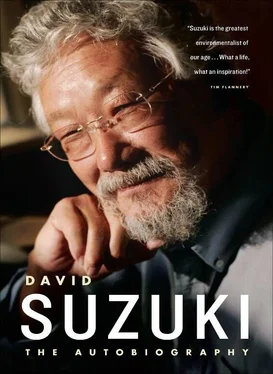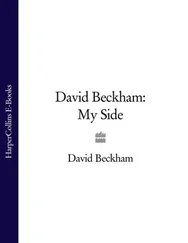
Harvesting salmon pituitary glands for future Nobel Prize winner Michael Smith's biochemical studies (yup, I used to smoke)
But the self-sufficiency of my lab, our enthusiasm, and no doubt our arrogance, set us apart from the rest of the department. We looked down our noses at the folks in fisheries and wildlife biology, snorting that they were just descriptive biologists, not real experimental scientists like us. I cringe when I think back on that cockiness and sense of superiority. Yes, that feeling of excitement about our work created a strong sense of community, but it also alienated me from most of my fellow faculty members. Confident in my teaching and research and absorbed in my own community of students, I had little interest in the local politics of academia and lived in a kind of self-imposed isolation from the rest of the university. If they didn't bother me, I was happy to be left alone.
Not surprisingly, as I spent more and more time in the lab, Joane and I had less and less time together. Besides Tamiko we now had Troy, born in 1962; dinner, bathing the children, reading to them in bed — that was a steady part of my routine before going back to the lab. But even on our family camping trips, the lab often went along. Joane had every justification for demanding more of my company. She had worked hard so that I could go to graduate school even with a child, and once I was settled as a faculty member, we should have had more opportunities to be together. But I was too ambitious to give up the time; I was much more focused on doing a really elegant, important experiment. Our marriage was ending. Soon after the birth of Laura, our third child, in 1964, Joane and the children moved into a home we had just bought. I did not.
On April 4, 1968, American civil-rights leader Martin Luther King was assassinated, and students at UBC organized a rally on the steps of the library to express our sorrow. I was an associate professor and spoke out, telling British Columbians that this was a time for us not to smugly reaffirm our sense of superiority over Americans but to reexamine our own society. I reminded them of the incarceration of Japanese Canadians during World War II, the treatment of Native people, and the fact that Asians and blacks were not allowed to vote in B.C. until the 1960s. The Vancouver Sun wrote a scathing editorial that chastised me for opening old wounds, for raising issues that were not relevant on the occasion of a King memorial. It was then that I realized how important tenure was as I was subtly informed that university administrators were nervous about faculty members who might attract negative publicity.
When Joane and I had separated in 1964, my department head warned me that a broken marriage could jeopardize my career. A faculty member from Microbiology drove me home from campus one evening, and as I was about to get out of the car, he said, “I would be remiss if I didn't say that by breaking up your marriage, you will pay a price within the university.”
On many fronts, the university was still adjusting to rapidly changing values in society.
WHEN I HAD RETURNED to Canada from the U.S., I had been consumed by a passion to study cell division in Drosophila and thought I had some clever tricks up my sleeve. But I also enjoyed teaching and put a lot of time and energy into it. My early years of public-speaking contests and courses paid off in my abilities as a “performer.” I encouraged students to interrupt me at any time if they were confused or had a query.
Students were interested in far more than how many points an exam was worth or what would or would not be on the final test paper; they wanted to explore the implications of the work I was discussing — societal issues related to genetic engineering, cloning, and eugenics — so I was forced to read up on the history of genetics, which I hadn't been taught in college. It was devastating to me to discover that geneticists early in the twentieth century had extrapolated from their studies of the heredity of physical characteristics in mice, fruit flies, and plants to make pronouncements about the heredity of intelligence and behavior in humans. Back then, genetics was an exciting new science making huge inroads in our understanding of the mechanisms of heredity, and no doubt seemed to them as if we were on the threshold of acquiring incredible powers to manipulate human heredity. But these grand claims ended up in discriminatory legislation prohibiting interracial marriage in some U.S. states, restricting immigration of certain ethnic groups, and permitting sterilization of inmates in mental institutions for genetic reasons. It was a shock to discover that the grandiose declarations of geneticists had been used in Canada to justify the fears of treachery from Japanese Canadians that led to our evacuation and incarceration, and in Nazi Germany to support the Race Purification Laws that culminated in the Holocaust.
I decided I had to speak out about the potential abuse of genetics. For my colleagues in that field, this did not sit well, especially as revolutionary insights and techniques for manipulating DNA seemed to presage a cornucopia of wonderful applications. I kept trying to remind geneticists of the disastrous consequences that had resulted from claims made by equally eminent geneticists only two generations before. It has been a lonely role for a geneticist to raise issues of concern when there was and is so much enthusiasm and so much apparent potential for revolutionary applications.
In 1991, I was invited to host an eight-part series of one-hour television shows on the genetic revolution, in a coproduction between the American PBS and the British BBC networks. In Britain, the series was called Cracking the Code , in the U.S., it was The Secret of Life , and it was broadcast in 1993. It was a huge success for nonprofit PBS, earning a review in Newsweek magazine that said the series was the “first sign of intelligent life in the television season.” Because of the success of the series, I was asked to be the moderator of an all-day symposium in Oklahoma City in April 1995, only two weeks before the tragic bombing of the Alfred P. Murrah Federal Building by an antigovernment extremist that killed 168 people.
The symposium participants were eminent geneticists discussing the exciting implications of their work, and the star of the meeting was Nobel laureate James Watson, co-discoverer with Francis Crick of the double helix. I was effusive in my introduction of Watson, talking about how few scientists were as successful as he was, living to see their work become the stuff of textbooks, blah, blah. When I called for questions after his talk, people were shy at first, so I took the initiative and asked Watson what I thought was an innocuous question about the social and ethical implications of the revolutionary techniques in molecular biology. To my astonishment, in response, Watson lashed out and attacked me personally: “I know what people like you think,” he snarled. “You want everyone to be the same.” Then he proceeded to mock those who raise moral and ethical issues around modern genetics.
I was truly offended, disappointed, and embarrassed, all at once. He had put words into my mouth that made me into a straw man he could easily knock down. As moderator of the session, I felt it would be wrong for me to start debating him, so I let him finish and called for the next question, my cheeks burning with rage. I knew that later that evening, when I was no longer moderator, I could rebut Watson, but he left immediately after our session was over. My rebuttal felt pretty hollow, but I gave it, saying Watson was totally wrongheaded. “Yes,” I said, “I believe in the concept of equality before the law, which is a magnificent concept. But as a geneticist, I know diversity and difference are a part of our makeup, and no one should want to diminish that.”
Читать дальше



![David Jagusson - Devot & Anal [Hardcore BDSM]](/books/485905/david-jagusson-devot-anal-hardcore-bdsm-thumb.webp)









